

761


South America:
- Argentina
- Trinidad - Tobago
- Ecuador
- Chile



761


South America:
- Argentina
- Trinidad - Tobago
- Ecuador
- Chile
North America:
- Costa Rica
- Belize - Cuba


Africa:
- Nigeria

- South Africa
- Ghana
Many of Eastern’s international students come from the countries listed on the map or through an exchange program in one of the listed countries. A vast majority of Eastern’s international student population comes from India and Nigeria.

Europe:
- Switzerland - Sweden - Iceland
- Ireland - France- Italy - UK
Asia: - India
- Japan

- Vietnam
- South Korea
- United Arab Emirates (UAE)
Oceania: - Australia

- New Zealand
The Daily Eastern News
1811 Buzzard Hall
Eastern Illinois University Charleston, IL 61920
217-581-2812
217-581-2923 (fax)
Editor-in-Chief Madelyn Kidd DENeic@gmail.com
News Editor Cam’ron Hardy dennewsdesk@gmail.com
Photo Editor Rob Le Cates denphotosdesk@gmail.com
Assistant Photo Editor Ashanti Thomas denphotosdesk@gmail.com
Sports Editor Autumn Schulz densportsdesk@gmail.com
Assistant Sports Editor Kate Stevens densportsdesk@gmail.com
Opinions Editor Ellen Dooley denop.eds@gmail.com
Editorial Adviser
Tim Drachlis
Photo Adviser Greg Cooper
Publisher Joe Gisondi
Business Manager Betsy Jewell
About
The Daily Eastern News is produced by the students of Eastern Illinois University. It is published weekly on Wednesday, in Virden, Ill., during fall and spring semesters and online during the summer term except during university vacations or examinations. One copy per week is free to students and faculty. Additional copies can be obtained for 50 cents each in the Student Publications Office in Buzzard Hall.
Advertising
To place an advertisement or classified ad in The Daily Eastern News, call the ads office at 581-2812 or fax 581-2923. Visit our online advertisements at dailyeasternnews.com/classifieds.
Comments / Tips
Contact any of the above staff members if you believe your information is relevant.
Corrections
The Daily Eastern News is committed to accuracy in its coverage of the news. Any factual error the staff finds or is made aware of by its readers will be corrected as promptly as possible. Please report any factual error you find to Editor-in-Chief Madelyn Kidd at 581-2812.
Employment
If you would like to work for The Daily Eastern News as a reporter, photographer, columnist, cartoonist, copy editor, designer or videographer, please visit at the newsroom at 1811 Buzzard Hall.



According to Associate Vice President for Enrollment Management Josh Norman, there are currently 761 international students enrolled from 52 countries.
With that, international students account for around 13% of Eastern’s population. Eastern currently has a total of 6,008 students. Specifically, there are 4,533 undergraduate students and 1,475 off-campus students.
The study abroad program allows international students to come to Eastern and experience a different culture and obtain different global perspectives.
Norman gave reasoning as to what another reason could be for students to want to come to Eastern.
“I believe the value of an education at EIU is one of the greatest driving factors for most international students,” Norman said. International students also allow people that already live in the area to gain knowledge on different diversities and cultures. Specifically in the classroom, having someone from across the world give their perspective on a topic allows other students to have well-rounded conversations.
Networking is also a benefit for studying abroad opportunities. The connections that can be made by traveling can be useful in the future.
According to Forbes.com, “These students also spoke more seriously about the benefits of an education in the United States. There’s a more open social environment here, they said, more educational opportunities, more interaction with and mentorship from faculty and staff. A student from Eastern Europe praised the kinds of informal interactions with professors that are so common in the United States but not, she said, in her country. These students gain tremendously from the chance to experience our culture, learn
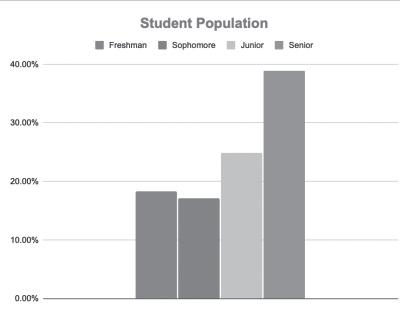
from our experts, and connect with America’s global leaders in industry, research, activism.”
The same article stated, “Learning and living alongside people from around the globe helps all of our students learn to avoid stereotyping and form more informed opinions. It gives them a better understanding of international issues, foreign affairs, and immigration issues. It provides opportunities for unique cross-cultural experiences, whether celebrating new holidays, sampling new cuisines, or traveling to visit friends in their home countries. It forces students to confront different interpersonal and communication styles, which makes them better active listeners and critical thinkers. And it opens them to wonderful personal and professional connections that will benefit them throughout their careers.”
Norman also talked about what Eastern
does to market itself for international students.
“I believe our general marketing is appealing, especially through social media, where we see a lot of international student engagement,” Norman said. “The personal attention and small but caring community are themes that really connect with international students that want to pursue their education in a caring and supportive environment.”
According to the fall 2022 tenth day enrollment numbers, there was a 91.98% increase in the international student population from the 2021 fall semester. There were 399 international students during fall 2021 semester, and 766 in the fall 2022 semester.
Cam'ron Hardy can be reached at 581-2812 or at dennewsdesk@gmail. com.
Attention postmaster: Send address changes to:
The Daily Eastern News
1802 Buzzard Hall
Eastern Illinois University


Being an International student comes with a bunch of different life experiences. Whether it be trying a bunch of new foods, or getting acclimated to the Western cultures, people can learn to really enjoy themselves, but that doesn’t make it easy.
As for technology grad student Kyle Ignalaga, it is especially hard when he considers himself a third culture international student.
So what does it mean to be a third culture student?
Ignalaga explained that he grew up in the middle east, in Bahrain, but is also Filipino. When he came to Eastern for school, he was exposed to American culture too.
As well as being a technology student, Ignalaga also enjoys playing soccer with the EIU soccer pickup team on campus.
As for the World Cup, he agrees to the sport being called the world’s game. One of the reasons why he said he liked it is because it brings attention to the cultures that are participating in the tournament. Considering only a select few are able to participate, it is very intriguing to watch and be invested in the game.
“It’s about unity,” he said. “It’s about being together and just enjoying it, and it doesn’t matter where you are from. You don’t have to speak a language to play the game.
Ignalana enjoys learning about other cultures. He mentioned how growing up, he celebrated many of

the Middle Eastern holidays like Ramadan and EID, which is the Festival of Sweets is the earlier of the two official holidays celebrated within Islam. He also enjoyed his fair share of Filipino food and considering he knows five different languages, he
SUBMITTED PHOTO
feels it is very important to have students be educated in other worlds, and not just their own and he welcomes anyone interested with open arms.
“We are all students at the end of the day, but we would love for you
guys to be a part of our celebrations as much as you guys allow us to be a part of yours,” Ignalaga said. “I think the biggest thing is that we want to make you guys feel included as well.”
Although Ignalaga invites others to learn about each other’s cultures, he does have a confession.
For a long time, he struggled to find out who he was with all these life experiences.
“I’m a person that grew up in Bahrain, and at the same time, I feel like being exposed to Filipino culture can be a little weird because, you know, I’ve always grown up with Middle Eastern culture and seeing Filipino culture can make me feel like a stranger in my own home, if that makes any sense,” Ignalaga said.
But despite his internal cultural battle, Ignalaga believes that he is not just who is his by blood, but his life experiences, and how everything has shaped him into the person he is today.
“I’d rather be seen for who I am as an individual than who I belong to,” Ignalaga said.
So, then who exactly is Kyle Ignalaga?
“I’m just a Filipino international student who has been exposed to various cultures in the Middle East and in Asia,” Ignalaga said. “I’m someone who does technology, plays soccer, and lives his life with no regrets.”
Adriana Hernandez-Santana can be reached at 581-2812 or at aihernandez@eiu.edu.
Eastern’s chapter of University Professionals of Illinois, EIU-UPI, have been negotiating with the university for a fair contract. Union members have been working without contracts since Aug. 31 and have been negotiations since March 21, 2022.
On March 27, union members held a gathering to present University President David Glassman with a letter of intent to strike.
There were roughly 50 people in support of the event including other news sources. With the intensity of the matter increasing, publicity has been cumulating. Majority of the people that were present at the event were the union members, but at a previous event more students were present, potentially due to the time that it took place.
On Feb. 27, the union members held another event to present roughly 1000 postcards in support of increasing contract raises to Glassman’s office to be given to the Board of Trustees.
At this event, there were nearly the same amount of people with more students present.
This publicity is not the best and could have negative consequences for Eastern.
The union will have another negotiation meeting on April 3, which starts at 9 a.m. and goes until someone walks out.
If someone walks out of the meeting without a resolution, a strike will begin April 6. Another and final negotiation meeting will happen on April 7 after the first day of the strike.
Union members classes, advising appointments and other work-related responsibilities will be canceled during the strike.
With this type of light on the university, parents and students may stray away from

enrolling.
Seeing that administration and teachers cannot reach an agreement and have to stop working makes the university look unprofessional.
When delivering the postcards and a grievance in October, Glassman was not in his office, but he was in his office to be given the letter of intent to strike.
Some of those in attendance were surprised to see him. Regardless, the union members were loud and proud with what they were protesting.
Faculty said that they did not want to protest and go on strike due to it taking away time from the classroom and an example away from the students.
The university has refused to say anything regarding the strike to the media.
This is only going to reflect badly upon
Eastern.
Not getting your side of events out to the media and allowing one side to paint the scene only from their side of the fence leaves an unfair advantage for administration.
Students, the media, faculty and more have been ignored by administration, but had questions answered by union representatives.
This will not just reflect badly on Eastern’s community, but Illinois all together. Eastern is not the only public university with UPI negotiations happening in the past year. While some institutions have reached agreements, others move to strike.
Governor State University and Chicago State University UPI chapters have filed their intent to strike both within the first week of April.
For three public universities all possibly having union strikes in the same week is going to draw nation attention- and Illinois Governor JB Pritzker.
A strike from teachers at an institution claiming to be “all in” for students is bad press alone. If that press is nationally distributed, Eastern’s enrollment of new students, and new faculty, will suffer.
Even current students are, by majority, supportive of UPI members if a strike occurs.
Lucy Ade, the student body president, said while students may be concerned of losing educational moments, they are understanding of the union’s side of the situation.
“The UPI negotiations and possibly strike have been an interesting and honestly confusing time for students,” Ade said. “I have heard from many students that are confused if there is a strike and if so when will it be. I believe a lot of students are also confused and worried about their future if there is a strike, especially those who are on tight schedules to complete their course. In my opinion, the student body is concerned about the possible loss of educational moments, but they are understanding of why the union is taking these actions.”
Ninety-seven percent of voting union members approve of going on strike, many students would support union member if they strike, by 87 percent according to The News’ poll, the media will seemingly lean in the unions favor since its the only side of the situation speaking out- how much more support and approval towards EIUUPI is Eastern’s administration looking for?
The Editorial Staff can be reached at 581-2812.
As a former EIU-UPI chief negotiator and chapter president, as well as an EIU Faculty
Senate chair, I learned conflicts are inevitable and resolutions are necessary.
After months of delay, it’s high time for President Glassman and Eastern’s Board of Trustees to reach a resolution – a fair contract Agreement – with Eastern’s chapter of the University Professionals of Illinois. Doing so will benefit everyone at
Eastern and the larger community.
Students will benefit.
They’ll know classes will continue, grades will be recorded, and graduations will proceed.
Faculty and academic support professionals will benefit.
They’ll know Eastern’s President and Board value them with a reason -
able standard of living in the face of inflation and a history of substandard increases.
Morale matters, especially when key administrators have recently been granted extremely generous compensation packages.
The surrounding community will thrive when more people can contin -
ue to afford to purchase goods and services.
I urge President Glassman and the Board to do the right thing – to support and encourage their faculty and academic support professionals, those who nurture and educate Eastern’s students and contribute to the larger community as citizens in so many ways.
EIU’s potential is greatest when conflict advances to resolution, and resolution advances to progress.


University professors—especially in liberal arts fields—are notoriously underpaid.
Especially at state schools.
And especially at non-D1 state schools.
And at Eastern, the salaries are even more pitiable (unless, apparently, your last name begins with “G”).
Even so, in contract negotiations between the union that represents professors and other education professionals on campus and Eastern’s administration that have dragged on for more than a year, the administration has proposed an effective pay cut for professors.
Needless to say, the educators represented by Eastern’s chapter of University Professionals of Illinois (EIUUPI), understandably, are not having any of it.
These fine academics have been working without a contract since last August.
And now because the administration clearly fails to take any of this seriously, the union has authorized a strike, which could result in canceled classes.
And I am okay with that—the professors got to do what they got to do to make a living, and clearly, because of the lack of good faith negotiating on the part of the administration, they have little choice.
The administration, in its infinite
wisdom, and spearheaded by the charming comedy duo of Glassman and Gatrell, advised online students (like me) that in the event of a strike:
“If you’re enrolled in an online course or an online element of a hybrid course, make sure to participate in online activities and complete the coursework as scheduled in the course outline.”
Even better, in-person students are supposed to “[a]ttend all scheduled lectures, labs and studios even if an instructor indicates that the class may not meet during a potential strike.”
So, let me get this straight. In a strike, are we supposed to show up to class and work quietly on our own?
Without the guidance of a professor?
This is a joke, right?
We bought our own books. We bought our own supplies.
The only thing we are paying Eastern for is the use of its professors, who, in turn, will guide our education and impart knowledge.
Without professors doing just that,
there is no value, and we students are deprived of the benefit of the bargain we made with Eastern: We give you tuition dollars, you give us professors who will teach us.
We can get anything else we need from YouTube and TikTok.
We had a deal Eastern. In legalese, I would call it a contract: You offered me a spot at the university, I accepted.
As consideration, I would receive professor-led education, and you would receive my tuition dollars.
If I do not receive what I contracted for, Eastern, you have been unjustly enriched.
And I want a refund.
P.S. When Glassman retires, he will make $170,000 per year as the highest paid professor on Eastern’s campus.
To teach anthropology. (I hear there is a buck to be made in that racket).
Trent Jonas is an English graduate student. He can be reached at tcjonas@eiu.edu or 217-581-2812.
" The labor movement was the principal force that transformed misery and despair into hope and progress. " - Martin Luther
The end of the month and the stretch before the end of the semester is coming around.
The one thing being discussed in all of my classes currently is whether or not my professors will be participating in the strike.
My professors are on board and are fine with a strike if it means getting something they have been working towards for years now.
A lot of students see this as an opportunity to not attend classes.
This could be a plus until we realize what it means for us and how we need to take this moment seriously.
The reason for the strike is a money issue.
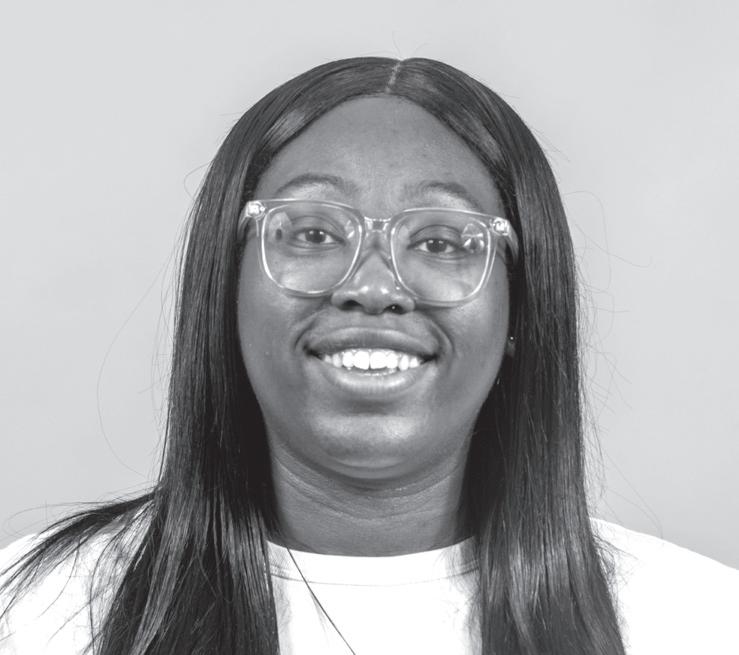
sors of all kinds and for all subjects are not being paid what they should be is almost a slap in the face.
Our educators teach us so that we can go on and be successful.
They are essential to our generation and future ones furthering their knowledge.
We go to school from the time we are five years old and some of us continue until we are in our late twenties.
We need educators to guide us through each year of school and to teach us the things that we need to know.
the most important professions in this day and age.
While I do not want a strike to occur, and while these matters should not have even gotten this far, I have no problem with classes not being held in order to get our professors the pay and treatment that they rightfully deserve. It is not a riot, it is not violent outrage, it is a protest in order to get the rightful treatment that our educators deserve.
I have professors who have been in school for years and are studying to become an expert in the field that they teach. They should be properly compensated for their accomplishments and the fact that they come and teach us everyday.
So why is it that we are treating our educators horribly and paying them terribly and expecting them to want to stay in this profession?
It does not make sense.
The fact that teachers and profes -
Our educators are at the forefront of
I support our professors during this time and with the possibility of a strike looming among the Eastern community, I stand with our faculty.
Kyla Moton is a junior English/ creative writing major. She can be reached at klmoton@eiu.edu or 217-581-2812.

Considering that Eastern does not do any advertising or recruiting to other countries, the word of mouth from former graduates really helps to keep our international student body in the hundreds.
The Office of International Students prides itself in having a high international student body, and the numbers are getting bigger.
All of the students choose to commit to Eastern simply based on word of mouth from former graduates.
For the demographic makeup, there is currently a total of 740 international students, with the largest contributions being students from India. Making up around 500 individuals. The second highest would be students from Nigeria. The remaining students are from places such as Brazil and Italy.
According to Benjamin Reinbolt, the designated school official, one of the biggest reasons why Eastern has such a high number of international students is the technology program.
“I mean, we have a really strong international demographic in the technology program, most of our technology students are in our graduate program,” Reinbolt said. “They’re mostly technology, and almost all of them are from India, but we do have a few students that are from Nigeria, and some from other countries.”
While many students in the grad program get to really experience the
Western culture, there are some struggles that they encounter while going to school in America.
Coming from out of the country, one of the biggest and most common issues that students face is transportation.
“They don’t have their own vehicles when they come here, some don’t have the US drivers licenses either,” he said. “So they may have driven back home, but they would need an inter -
“The international students are able to make some really good memories with one another, and it’s a great way to be able to regularly interact with all of the students.”
-Bussa
national driver’s license, and it’s only good for a certain amount of time.”
Reinbolt recognized the Panther shuttle or Dial-a-Ride to be some types of options for students, but considering the different hours, it can be hard for students to get to the store and back in a timely manner while getting what they need.
Hence, why once a few times a semester, an email is sent out to let students know that there will be a trip to campaign to go food shopping.
“We stop in Urbana and stores in Champaign so students could buy essential items, or things that can’t be bought around here,” he said. “So we made a stop at the African food store in Urbana, and the Korean market in Champaign. We have a ton of people show up for those trips, I mean, we had 35 to 40 something [students] that came this past Saturday.”
As for the office, they do take care of helping students out with any types of potential immigration issues or documents to be certified to work, but there is another section that a lot of people don’t know.
“Homeland security, which is another component of our job, I think people don’t realize you know, we do a lot of that stuff,” Reinbolt said. “When students get here, we enter their information because CMS (Centers for Medicaid Service) has to keep track of all that information. We also have to make sure that they’re doing what so that they can keep them legal.”
When it comes to tuition, the average cost for an international student is around $28,000 per year. Considering it is a higher price, and excludes the cost of living, the office offers tons of scholarship opportunities to help ease the cost.
Of course, there is only so many scholarships that can only pay for so much. Luckily for these students, there’s jobs on campus to help those
individuals make a little bit of income for themselves. Rienbolt says that 60% of the staff body for the House and Dining Center is made up by the international students.
Besides ensuring the safety and well-being of the international students, there’s a ton of events that the office hosts three to four special events per month to try and get the student body more engaged.
Bhanuprathap Bussa, a graduate assistant studying computer technology, says that he really enjoys the events because of all the interactions students get to have with one another.
“The international students are able to make some really good memories with one another, and it’s a great way to be able to regularly interact with all of the students,” Bussa said.
Kyle Ignalaga, another grad student studying technology, said that he enjoyed the events that the university hosts, and welcomes all of the students to come and participate.
“I would definitely recommend other students to participate in different events held across campus, which I understand can be a bit daunting to go to these events , especially when they’re in a location that you’re not familiar with, but I would say that getting [familiar] or getting comfortable with the unexpected is the best thing that can happen to you,” Ignalaga said.
Adriana Hernandez-Santana can be reached at 581-2812 or at aihernandez@eiu.edu.

The difference between cultures, let alone holidays, is significant for international students at Eastern, specifically biological science major, Nora Okolie.
That makes cultural holidays quite different from one country to another, from different independence days to even different holidays.
“Well, we have our Independence Day on October 1, then we do celebrate like some Christian holidays like Christmas and Easter, and we also have May first as Workers Day, then we also have some Islamic holidays that we also celebrate in Nigeria,” Okolie said.
The Nigerian Independence Day is quite different and added it is less fireworks and more gathering at the table Okolie said.
Holidays like Halloween and Thanksgiving gave Okolie a unique experience as a student on campus.
“One major thing I would say is it’s like, for example, Thanksgiving,” Okolie said. “We don’t have that in Nigeria. We do not have Halloween in Nigeria,” Okolie said.
The differences between the holidays in the U.S. and Nigeria are quite different with that Okolie explains how the celebrations in both countries are different.
“So last year was my first time actually being involved and participating in that and it was definitely nice,” Okolie said. “It was definitely interesting to see the different ways in which you don’t celebrate it like you’d come together, eat a meal together, and with Halloween, you have costumes and everything and so, there’s definitely a major difference because with Nigeria, I think, at least for the Independence Day, I think one major difference I saw was that you don’t have like as many fireworks.”
Nigeria has a different atmosphere when it comes to their Independence Day.
“Back home it’s mostly just like, you can come together as a family, and you celebrate, and you eat a ton of food, and I remember when I was in elementary school, they will make us all dress up in different cultural attire, for our Independence Day,” Okolie said.
Okolie explains the attire that Nigerians wear involving Independence Day is unique and different compared to how the U.S. celebrates Independence Day.
“So, in Nigeria, there are three major tribes, there’s Yoruba and there’s Hausa and there’s also other tribes, many different tribes in Nigeria and so basically, they would ask us to wear the attire of your tribe,” Okolie said. “For ex-

ample, I am Edo. So, you must wear headgear. You wear the blouse, and you tie the wrap and things and so that is what you wear to school,” Okolie said. Okolie said that there should be more participation of cultural holidays, especially at Eastern.
“Each country definitely has their own holidays that stands out to them and that’s what makes all of us unique and you know, there has to be some differences so that is okay,” Okolie said.
“I’d say I mean, like this and just like being able to talk about things like that it definitely helps to spread the awareness that you know, there’s different forms of holidays and different cultures on campus. This is a step forward in like making things, making people or students on campus aware of what is going on.”
 By Kate Stevens Assistant Sports Editor | @katestevens25
By Kate Stevens Assistant Sports Editor | @katestevens25
The Eastern softball team will stay atop the Ohio Valley Conference standings after sweeping SIUE 1-0 and 5-2 in a doubleheader at its home opener Sunday afternoon at Williams Field.
The team moved to 5-0 in conference and 16-12 overall.
After having multiple adjusted starting times and cancellations, the Panthers were finally able to host their home opener.
Head coach Tara Archibald said she and the team were ready to finally play at home.
“Finally,” Archibald said. “I think the girls were super excited to be able to finally get to play in front of their home crowd and get out on our field.”
Right-handed pitcher Rachel Kaufman led the Panthers in the first game and Olivia Price led the way in the second game. Kaufman allowed just three hits and struck out four batters.
Her game ERA was 0.0.
Price also earned a win in the second game as she recorded five strikeouts and had a game ERA of 1.0.
The first game was a battle of the pitchers as SIUE’s pitcher Kelsey Ray allowed 7 hits and had four strikeouts.
There was no scoring action between the teams until the bottom of the seventh inning where EIU’s Lindy Milkowski was in as a pinch hitter and hit a single down the rightfield baseline allowing Marama Makea to run home and score, giving EIU the walk-off 1-0 win.
There were two back-to-back weather delays during the second game, allowing only half an inning to take place between them. The difference between the games was night and day as the first game was sunny and the second was dreary and rainy. This did not deter the Panthers from focusing on getting another win for the day.
The teams battled it out for three innings before the first delay was called. The game
was tied at 1-1. The teams made their way back out and played part of the top of the fourth inning and the second delay was called.
After the second delay, the teams came back out again and were able to finish the game.
Archibald said the team took advantage of the delays and kept focus on getting back out to the field and completing the game.
“The first delay, I thought we handled it really well,” Archibald said. “The second delay when we came in, I was a little worried that our mentality would be ‘not again, kind of tired of it.’ And then, you know, we really took some time and refocused. I thought they handled that well when they came back.”
Once the teams got to the bottom of the fourth inning, the Panthers were down 2-1.
The Panthers saw a shift in momentum as they were able to score four runs in the fifth inning that put them up 5-2.
They forced SIUE to change pitchers as Riley Dittmar scored. After the change, Rachel Kaufman, Jaylen Prichard, and Aryn Henke all scored as well. Archibald was proud of the team’s ability to get up on SIUE after the delays.
“To be able to answer that and put that dagger and not just get one to tie it, but two out RBI’s,” Archibald said. “One thing we’ve talked a lot about is to win ballgames, you got to have out RBIs and to continue to get those, I thought Aryn Henke was really huge for us right there to tie it and then to just keep putting the runs up. They helped us out a little bit there, but to keep putting the runs up, I thought that was big time.”
Getting those runs ultimately secured the win for the Panthers as Price was able to not allow any runs in the 6th or 7th inning.
Archibald said the team had a good day even with all of the prior adversity of cancellations and then with the two delays during the second game.
“I thought it would have been really easy
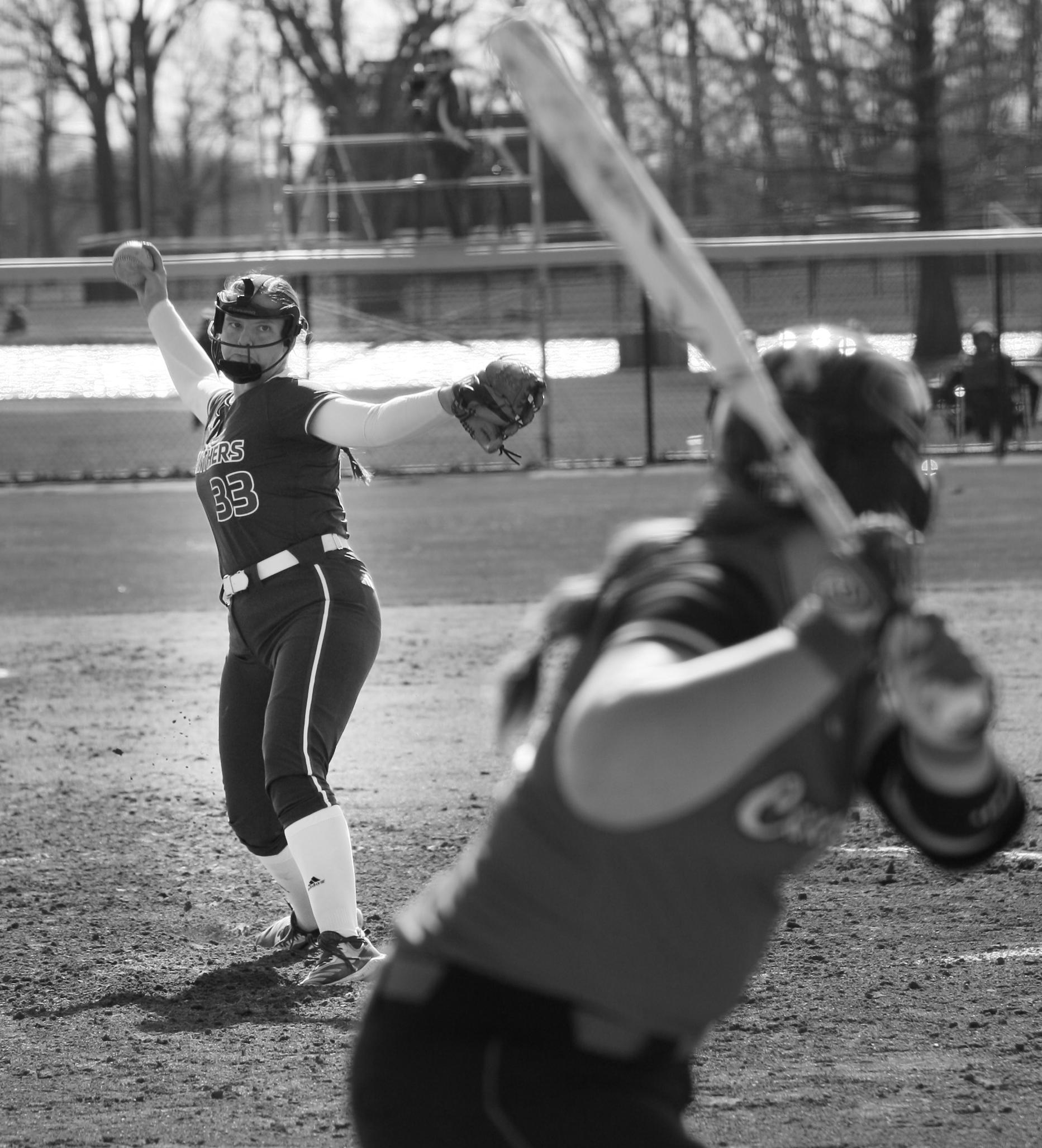
for them to lay down, but I thought they fought really, really hard and just a really good team day for us,” Archibald said. “I thought we won in a lot of different ways with good pitching, good defense, and we got some timely hits.”
She also said she is happy with an OVC sweep and hopes that the team continues playing at this level.
“It was huge,” Archibald said. “Anytime you can sweep an OVC opponent, that’s a big deal. And they’ve put themselves into a
good spot right now. We’ve just got to continue to trust our process and do what we do.”
The Panthers will travel to St. Louis for a Wednesday evening single-game matchup with Saint Louis University at 4 p.m. They will resume OVC play this coming weekend as they travel down to Nashville for a series with Tennessee State.
Kate Stevens can be reached at 5812812 or kestevens2@eiu.edu
International student athletes from all around the world attend Eastern Illinois University to play sports in the United States. Many of them are excelling in their respective sports, as well as their academics, but there are challenges along the way.
Eastern women’s soccer goalie Daniela Bermeo is from Barcelona, Spain. She said that she chose to come to the United States to play because back home, women’s soccer wasn’t as big as it is here in the United States.
“I had this goal that I wanted to go pro, but I knew that it was going to be something really hard,” Bermeo said. “So, I decided to make some changes and come to the states, because soccer was bigger here than back home.”
Coming to the United States gives international student athletes a chance to not only play the sport they love at a competitive collegiate level, but also allows them to study along with it.
Bermeo said that one of the reasons she came to Eastern is because she liked the sports management program that is offered, and that it allows her to study and play the sport that she loves.
Elisavet Papageorgiou, former player for the Eastern volleyball team, said that one thing that the United States has that her home country of Greece does not provide, is the ability to play volleyball and study.
“Where I come from, it is really hard to play volleyball, or your sport, and do your academics because if you do sports, then your academics will be lower and if you do academics, you cannot combine them because your coaches are not really supportive of it,” Papageorgiou said.
Catalina Rochaix, a current Eastern volleyball player from Cordoba, Argentina said something similar to Papageorgiou.
“I like the program that Eastern Illinois University has, and how the sports and the study are combined here, so it was the main reason the I chose the states and Eastern,” Rochaix said.
Though the athletes mentioned many good aspects of coming to the United States to play, all of the athletes mentioned one negative aspect in common: the language barrier.
Speaking another language, coming to another country where the majority do not speak your language, and having to excel in your school and sport not knowing much of the language would be incredibly difficult for anyone but all of these athletes love their sport so much that they’ll do whatever the need to.
Bermeo said being taught in a language that is not her first language makes it even more difficult.
Regarding language barriers, Rochaix said: “I think it affected me the first month, but there are so many
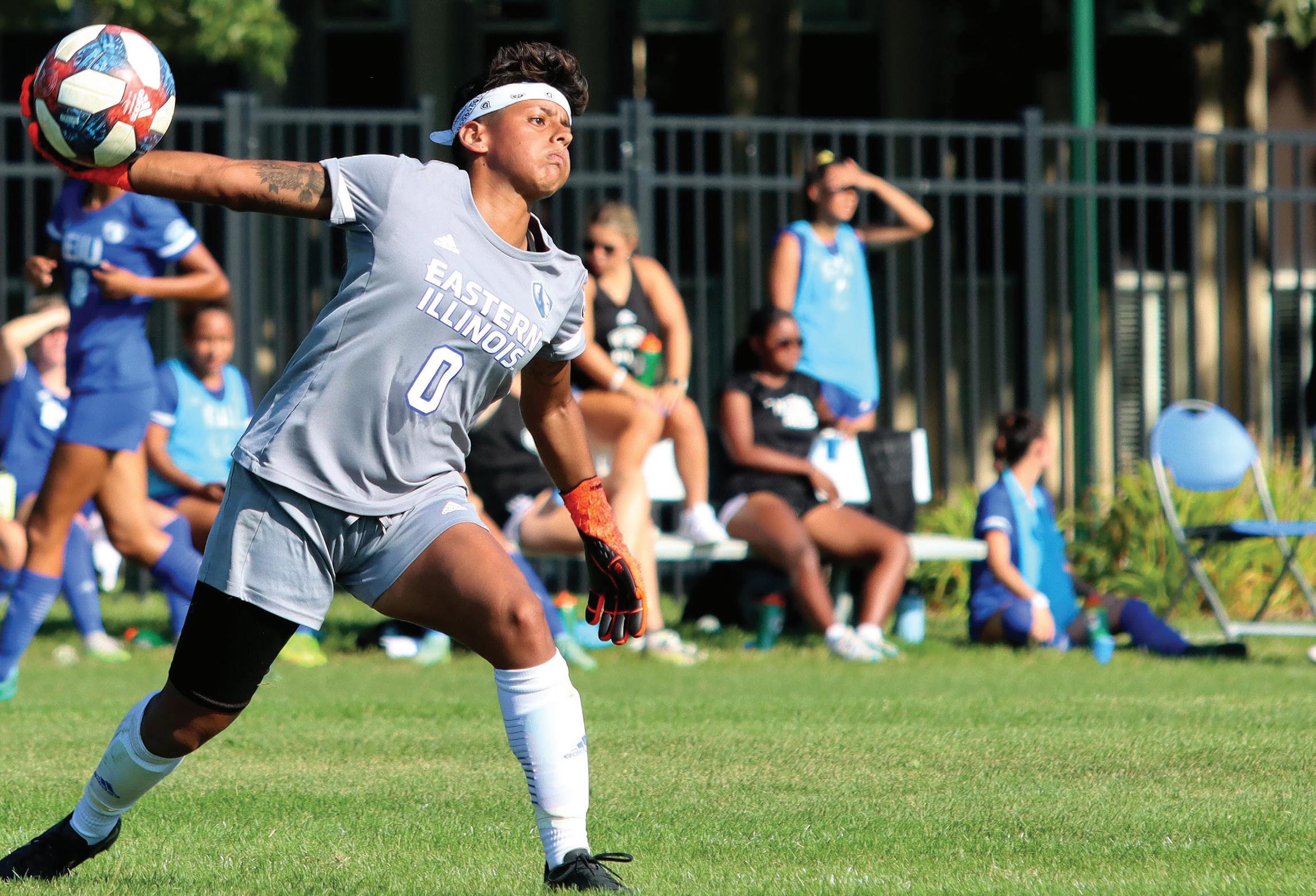
people here that can help me.”
Papageorgiou said that there were times when someone would say something to her and the translation in her head would be completely different.
There are also multiple differences between the game-play in the United States and back home for these athletes.
Bermeo says that the practices and effort needed here are much more demanding than back home.
“Practices are harder than back home, and we practice almost twice a day. You’re playing for your school, so I would say the commitment is more than back home.” Bermeo said.
Marama Makea, from Wellington, New Zealand, plays for the Eastern softball team
She said that there are a few differences between playing softball in the United States versus back home.
“I miss my family, especially when they can’t make any games, but my entsgrandparare hoping to come catch a few games in the spring.”
- Marama Makea
“It differs a lot,” Makea said. “In terms of the competition level, the funding, the resources and facilities.”
Makea also said that it is much
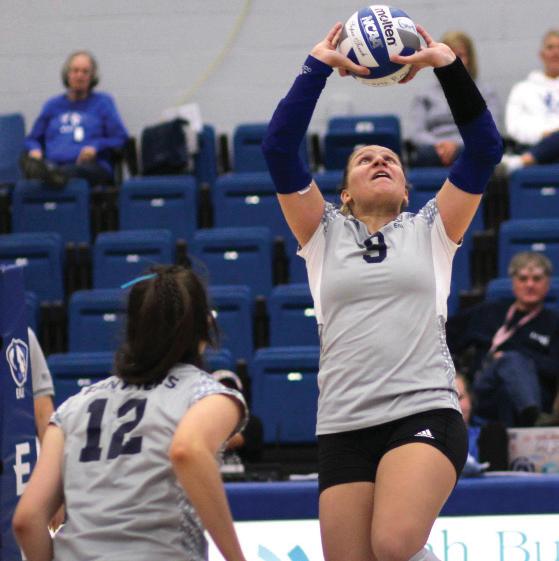
more competitive here in the United States than it is in New Zealand.
Another common difficult aspect that the athletes mentioned was the difficulty of being away from home, your friends, and your family.
“I miss my family, especially when they can’t make any games, but my grandparents are hoping to come catch a few games in the spring.”
Makea said.
Bermeo said that other international athletes know how difficult it
is to be away from their friends and family, and they all help each other out.
While all of the athletes mentioned a few of the same issues, they love that they get to combine their sport with their academics.
They love the opportunities that playing in the United States has given them.
Han Byer can be reached at 5812812 or hrbyer@eiu.edu